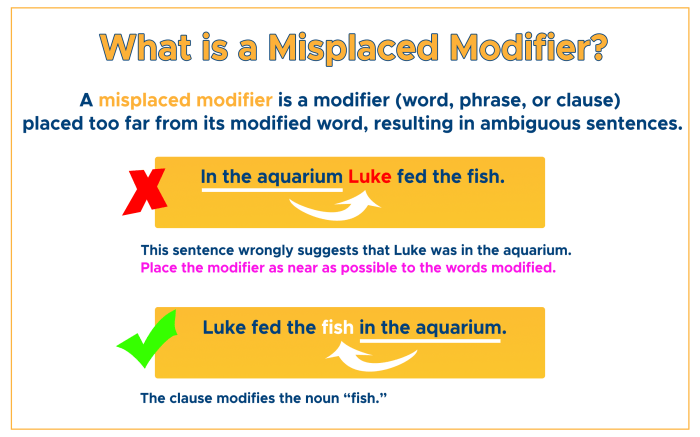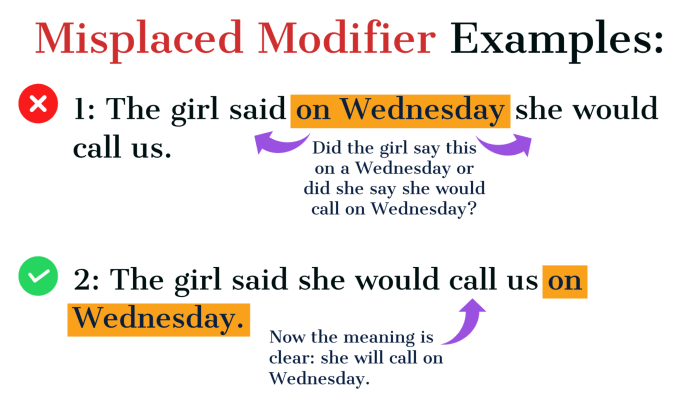Correct modifiers and concise wording are essential elements of effective writing, enhancing clarity, precision, and readability. This guide will explore the purpose and usage of modifiers, the importance of conciseness, and provide techniques for improving your writing skills in these areas.
1. Modifiers: Correct Modifiers And Concise Wording
Modifiers, including adjectives and adverbs, enhance writing clarity and precision by providing additional information about nouns and verbs.
Adjectives
Adjectives describe nouns and provide specific details, making writing more descriptive and vivid.
Adverbs, Correct modifiers and concise wording
Adverbs modify verbs, adjectives, or other adverbs, adding information about manner, time, place, or degree.
Common Pitfalls in Modifier Usage
- Misplaced modifiers
- Dangling modifiers
- Excessive modifiers
Strategies for avoiding these pitfalls include careful placement, clear reference, and moderation.
2. Conciseness
Conciseness is essential for effective writing, ensuring clarity and readability.
Techniques for Reducing Wordiness
- Use active voice
- Eliminate unnecessary words
- Avoid redundancy
Benefits of Conciseness
- Improved readability
- Increased clarity
- Enhanced focus on key points
3. Table Structure

| Heading 1 | Heading 2 | Heading 3 | Heading 4 |
|---|---|---|---|
| Data 1 | Data 2 | Data 3 | Data 4 |
| Data 5 | Data 6 | Data 7 | Data 8 |
This table demonstrates a responsive 4-column structure with headings and formatted data.
4. Bullet Point Structure

- Level 1
- Level 2
- Level 2
- Level 1
- Level 2
- Level 2
- Level 3
- Level 3
This bulleted list exhibits multiple levels of indentation, providing logical organization and clear hierarchy.
5. Examples and Illustrations

Example of Effective Modifier Usage
“The brilliant writer crafted an eloquent essay.”
In this sentence, the adjectives “brilliant” and “eloquent” enhance the nouns “writer” and “essay,” adding specific details that improve clarity and precision.
Example of Conciseness
Verbose:“In the event that you have any questions, do not hesitate to reach out to us.”
Concise:“If you have questions, contact us.”
The concise version removes unnecessary words and redundancy, improving readability and focusing on the key message.
Key Questions Answered
What is the purpose of using modifiers?
Modifiers provide additional information about nouns, verbs, adjectives, and adverbs, enhancing their meaning and specificity.
How can I improve the conciseness of my writing?
Techniques for improving conciseness include eliminating unnecessary words, using active voice, and avoiding jargon and redundancies.
What are common pitfalls in modifier usage?
Common pitfalls include misplaced modifiers, dangling modifiers, and incorrect agreement between modifiers and the words they modify.